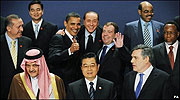When the G20 leaders met in London in April the world was in the grip of the worst recession for 60 years. A fistful of commitments were made to rescue the global economy, kick-start trade and provide help to the poorest nations.Nearly six months on, have they done what they said they would?


When the G20 leaders met in London in April the world was in the grip of the worst recession for 60 years.
A fistful of commitments were made to rescue the global economy, kick-start trade and provide help to the poorest nations.
Nearly six months on, have they done what they said they would?
The Economy
The overarching economic commitment was to do whatever was necessary to restore confidence, growth and jobs.
They have certainly been active, spending money hand over fist and, in some countries, borrowing heavily to pay for it.
Many central banks, notably in the United States, Britain and Japan, have also been doing some unusual things. Their official interest rates are very low and they have been pumping extra money into the banking system by buying assets in the financial markets.
There has been some success.
Some G20 economies that contracted have started growing again. France, Germany, Japan and Brazil all grew in the second quarter of the year.
Many economists think the US has started to grow in the current quarter - we’ll know if that’s true in late October.
Speaking of the global situation, the IMF’s chief economist Olivier Blanchard has said "the recovery has started”, though he does not seem convinced that it will be strong.
Job creation is tougher.
But then it would be. There’s nearly always a delay between resuming growth in output and an upturn in the employment situation.
That’s not to say the G20 job is done, and they know it. The recovery, such as it is, is still heavily dependent on these unusual policy measures.
In the long term some governments have borrowed heavily and will have a nasty debt problem to tackle. Some economists also fret that the extra money being poured out through central banks’ doors could create an inflation hangover later on.
Bank Lending
The London communique promised action to repair the financial system and restore lending.
The banks are largely functioning. So that is a success of sorts.
However, they aren’t functioning normally. But is that because they are reluctant to lend or because they can’t lend to consumers and firms who are pre-occupied with repaying debt?
The fact that the financial system is more stable than it was a year ago owes a lot to the decisions by many G20 governments, notably the US and Britain, to invest in banks, to provide them with extra capital.
Simon Johnson, a former chief economist at the IMF, says that if you shovel enough cash into enough banks you do turn the corner.
"It’s not very elegant” he says, "but it works”.
Financial Regulation
The London commitment to strengthen financial regulation is moving slowly. Simon Johnson says no progress has been made at all.
Some things will be more effective if they are co-ordinated internationally, rules on bank bonuses for example.
A new international agency called the Financial Stability Board - created after the London summit - has come up with some general principles of how bonuses should be designed to reduce the incentive to take big risks.
It is also looking at whether the total pool of bonuses for each bank should be restricted.
There are also painstaking discussions underway between financial officials on requiring banks to hold more capital, so that they can withstand losses better.
But Simon Johnson says that’s window dressing. He favours much larger increases in these capital requirements.
Two promises on the IMF have been kept. Its lending resources have been trebled and it has issued what is in effect extra IMF money to its member countries.
Helping the Poorest
And what of the low income countries, hit by the crisis but not members of the G20?
Claire Melamed of Actionaid says the London summit promised them $50bn.
She says half has definitely been delivered, which includes a share of the extra IMF cash. For the rest, she says, it is more difficult to tell.
But she doesn’t think much has come through from multilateral development banks (such as the African Development Bank) or from international trade finance.
In any case, she says, a lot of it was "smoke and mirrors - not new or not really money”.
In any case, she says $50bn was never anything like enough in terms of what low income countries needed.
Protecting against Protectionism
There was a promise to avoid protectionism, restricting trade in an effort to protect local jobs.
The G20 asked Pascal Lamy, the director general of the World Trade Organization, to monitor the situation.
He says: "On the whole governments have resisted the pressures. But there has been some slippage here and there.”
To paraphrase his verdict - it could have been a lot worse. That will probably also be the mood of the Pittsburgh summit, relief that the darkest fears of a year ago are receding.
The drawback is that it removes some of the pressure to make difficult decisions.
BBC


